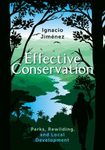![Socio-Ecological Studies in Natural Protected Areas Socio-Ecological Studies in Natural Protected Areas]()
Click to have a closer look
About this book
Contents
Customer reviews
Biography
Related titles
About this book
This book explores the interactions of local inhabitants and environmental systems in the Protected Natural Areas of Mexico. Its goal is to help understand how social groups contextualize ecological knowledge, how human activities contribute to modifying the environmental matrix, how cultural and economic aspects influence the use, management and conservation of their ecological environment, and how social phenomena are to be viewed against the backdrop of ecological knowledge.
The book reviews the epistemological and historical bases of the socio-ecological relationship, and addresses the evolution of human-natural systems. From a methodological standpoint, it assesses the tools required for the integration of “human” and “natural” dimensions in the management of the environmental matrix. Further, in the case studies section, it reviews valuable recent experiences concerning the retro-interactions of local inhabitants with their environmental matrix. Given its scope, the book offers a valuable asset for researchers and professionals all over the world, especially those working in Latin American countries.
Contents
Foreword
Preface
Part I: Theoretical Aspects
Chapter 1: Socioecology
Chapter 2: Beyond Paradigms: Socio-Ecology's heritage and prospective
Chapter 3: Effective ecological sustainability as a complex system from a social dimension
Chapter 4: In search of long-term conservation: objectives, effectiveness and participation schemes in Protected Areas
Chapter 5: Changing the paradigm for better conservation: Conceptual proposals from the environmental humanities
Chapter 6: Inclusion of the human factor in protected natural areas
Chapter 7: Uncontrolled Urban Growth: The Crisis of Protected Natural Areas near Cities in Mexico
Chapter 8: Dynamic simulation models and participatory approaches to support the sustainable management of social-ecological systems in Natural Protected Areas
Part II: Methodological Aspects
Chapter 9: The payment of Environmental services as an economic and governance mechanism for the conservation and management of Natural Protected Areas
Chapter 10: An integrated dynamic model for beach zoning in natural protected areas
Chapter 11: Managing the Galapagos National Park: a systemic approach based on socio-ecological modeling and sustainability indicators
Chapter 12: Local stakeholders' perception as a contribution to the identification of negative impacts on protected areas: a case study of Torres del Paine National Park
Chapter 13: ICZM Strategy for the Socio-ecological System of the Mar Menor (Spain): methodological aspects and public participation
Chapter 14: Training for aquaculture and fishery activities for the conservation and sustainable use of biodiversity
Chapter 15: Applying epistemic approach to analyze bio-intercultural relationships among local indigenous people and nature
Part III: Social Groups and Ecological Knowledge
Chapter 16: Sociocultural and environmental interactions between people and wild edible plants: the case of Sierra la Laguna Biosphere Reserve
Chapter 17: Hunting in the Yucatan Peninsula. Knowledge and worldviews
Chapter 18: The Nagoya Protocol, Intellectual Property, and Biodiversity Conservation in Mexico
Chapter 19: Social participation for implementation of trap-cameras projects in managed and protected natural areas of Mexico
Chapter 20: Socio-environmental affectation of coffee production activity in tributaries of La Suiza River at El Triunfo Biosphere Reserve, Chiapas
Part IV: Biodiversity Conservation Success from Socio-Ecological Approach
Chapter 21: Resistance of the Civil Society against Mining Projects
Chapter 22: Visions of the future in the oases of Baja California Sur, Mexico
Chapter 23: The challenge of the science of sustainability in protected natural areas. The case of the UMA "Wotoch Aayin" in the Ria Celestun Biosphere Reserve, Campeche
Chapter 24: Results of socio-ecosystem institutional management: analysis of two protected natural areas of central Mexico
Part V: Community Well Living Imporovement from Ecological Conservation
Chapter 25: Economic valuation of diving with bull sharks in natural conditions: a recent activity in Cabo Pulmo National Park, Gulf of California, Mexico
Chapter 26: Socio-ecological effects of government and community collaborative work with local development in a natural protected area
Chapter 27: Integration of resident fisherfolk communities in Marine Protected Areas by social micro entrepreneurships of mariculture: a case study at La Paz Bay, South Baja California, Mexico
Chapter 28: Community water management and conservation in Cabo Pulmo National Park (Baja California Sur, Mexico)
Part VI: Governance Changes from Sociecological Approach
Chapter 29: Walls of water, socio-ecological perspectives of governance changes in a protected natural area of Mexico
Chapter 30: A socioeconomic assessment for creating successful resource management policies for protecting the Champoton River in Campeche
Chapter 31: Socio-ecological approach of two fishery resources in the Centla Wetland Biosphere Reserve
Chapter 32: Ecotourism as a mean to promote community inclusion and nature conservation: the case study of Maya Ka'an
Chapter 33: Effective Management of the National Park Espiritu Santo, through the Governance, Planning and Design of an Integral Strategy for Los Islotes
Chapter 34: Analysis of a socio-ecological system: coastal zone of the Yaqui indigenous community (NW Mexico)
Chapter 35: Natural protected areas vs integrated watershed management: People participation analysis in Mexico
Chapter 36: The use of geographical environmental perception in the detection of contaminated urban streams: towards the proposal of environmental policies in Chiapas, Mexico
Part VII: Concluding Remarks
Chapter 37: concluding remarks
Index
Customer Reviews
Biography
Alfredo Ortega-Rubio, PhD is a Titular Researcher at the Northwest Center for Biological Research in Mexico. He has been honoured with three National Awards, bestowed by the President of the Mexican Republic, in recognition of his research on Mexican Natural Resources and their impacts, as well as his contributions for the benefit of society, including the significant promotion of the economic development of local communities, and biodiversity conservation. He has published over 200 original research articles and 26 books and has successfully led more than 150 major resource management projects, including those required to create the Sierra de La Laguna, Vizcaíno Desert and Revillagigedo Archipelago Biosphere Reserves. Having achieved the status of National Researcher Level III, he is also Editor-in-Chief of one scientific journal and Editor-in-Chief of one popular science journal. Since 2004, he has been a Titular Researcher in the CONACYT Research Centers system.




































